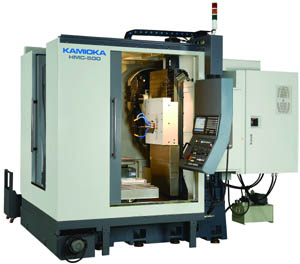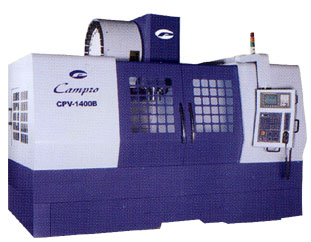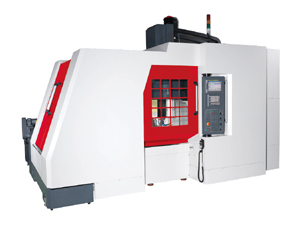Global Meltdown Fails to Hobble Machining-center Makers in Taiwan
Partnering with Japanese speciali
2010/04/01 | By Ben ShenDespite occasional reports of a gradually recovering global economy, Taiwan's machining center manufacturing sector is still reeling from the global meltdown, with orders dribbling in from China, where reports are that coastal areas are suffering from labor shortages due to unacceptably low wages offered. Even with many official stimulus programs, such as the Cash for Clunkers in the U.S., many businesses are still wary of the stability of the recovery, hesitating to place orders for machine tools to retool factories.
Makers of larger machining centers in Taiwan, however, can still design and build price-competitive, advanced machinery to rival counterparts from established makers in Japan, Germany, and the United States.
Technological Epitome
Building machining centers is considered the epitome in technological complexity for makers of metalworking machinery in Taiwan. One reason may be that machining centers have to be able to work in multi-dimensional modes, as in robot welders, while relatively simple lathes only have to turn a workpiece mounted on a spindle, which is only two-dimensional work. Some manufacturers on the island claim they have over the past year been successful to switch product categories—diversifying from CNC (computerized numerically controlled) milling machines and CNC lathes to more complicated machine tools.
The production hub of machining centers in Taiwan is centrally located for good reason, backed by a network of subcontractors in sheet metal, components, and surface treatment services. Some makers have even begun to develop water-jet cutters to satisfy overseas demand.
Taiwan's makers of machining centers, likely due to lack of options and to maximize credibility, generally adopt CNC controllers from Fanuc, Mitsubishi, and Siemens to not compromise potential performance of such machine tools. Only a few use PC (personal computer)-based CNC controllers. Some veteran manufacturers admit PC-based controllers are not yet technologically-developed enough to be programmed to do complicated machining tasks. Local makers typically use flat-priced, PC-based controllers for plastic injection molding machines, woodworking machines, and textile machines, for they don't need to work at as high accuracy as metalworking machines.
Customs-cleared statistics compiled by the Taiwan Machine Tool Foundation (TMTF), show that Taiwan exported US$418.15 million of machining centers in the first 11 months of 2009, down 63% from US$1.13 billion registered a year earlier.
The TMTF CEO C.C. Wang says the lingering impact of the global crash will continue to affect Taiwan's machining center makers till the second quarter of this year.

Japanese Technology
Kamioka Corporation is a typical maker in Taiwan who lacks in-house expertise, so relies on its Japanese partner, who specializes in electric-machinery integration, to develop advanced machine tools. Such technological transfer enables Kamioka to build reliable, high-quality machine tools. To facilitate such exchange of expertise, this maker has set up an R&D center in Kobe, Japan and an office in the U.S.
Kamioka claims, backed by Japanese technology, that it will revolutionize domestic machine-tool manufacturing to help upgrade price-to-value ratio in global sales.
Founded by president K.S. Huang in 1965, Kamioka is one of Taiwan's most specialized manufacturers of high-value-added machine tools that are known for superior structural rigidity.
Originally Kamioka offered metal-cutting services, including lathing, milling and grinding. Since 1986 and after moving its factory to Shenkang from Tangtze, Taichung County, the maker has been producing double-column milling machines and surface grinders by tapping its considerable experience.
Thorough Testing
About 10 years ago, Kamioka began designing and commercializing CNC multi-tasking lathes, and vertical and horizontal machining centers. “Each Kamioka machine is quality tested over 200 times, including examining parts during machining, with ball bars fully tested, 12-hour non-stop testing of cutting capability, and at least 120 hours of real-world operation before shipment. Our Kamioka-labeled products meet demands of makers of precision goods as molds, musical instrument and linear-guides,” says Chad Huang, the marketing director.
Being dedicated to reliability has paid off: Kamioka has sold some 500 VMC-1000 vertical machining centers without complaints nor need to do repair and maintenance.
A notable, innovative model recently introduced is the HMC-500 horizontal CNC machining center capable of multisided machining and complex surface milling. This new-generation horizontal machining center features intelligent design that realizes compactness, dependability and best-of-all affordability. Enhanced travel distances—500/600/550mm along X, Y and Z axis—make this unit more capable, whose desirability is further upgraded with a rotary table measuring 500 x 500mm coupled with 800kg load capacity.
In addition, this unit has a four-slide, wide-base guideway, cast-iron frame with heavy cross-beam reinforcement. The direct-drive is powered by a 15hp motor, 40-taper spindle for improved surface finishing and machining tolerance. Its swing-arm ATC with 24-tool capacity satisfies various tasks. Many operators look for the HMC-500 for upgraded reliability, exceptional machining and cost efficiency.
CNC Machining Centers
Founded in 2003 in central Taiwan, Campro Precision Machinery Co., Ltd. is a relative latecomer in this line backed by an experienced management team. Specializing in the development and production of CNC vertical machining centers, CNC horizontal lathes, and other machine tools, this maker sells most products under the Campro brand, and it also welcomes OEM orders.
Claiming to have a staff with over 20 years of experience in machinery development and production, Campro is dedicated to R&D, as well as adopting in-house manufacturing technology to offer wide-ranging products globally.
Offering four models of CNC horizontal lathes and seven models of CNC vertical machining centers, company president C.T. Tsai says that the maker has a monthly capacity of 15 to 20 CNC machine tools in Taiwan and another 12 in China. Campro machining centers have X-axis travel of 900mm to 2,200mm, with the 900mm model being its most popular.

3 New Models
In the first quarter of this year, the company unveiled three new models to further the competitiveness of users: CQV high-performance vertical machining center), CMV (high-speed mold making vertical machining center), and CPL (slant-bed type CNC precision lathe).
Its CQV-series high-performance vertical machining center has a 10,000rpm spindle, 1100x560x 560mm X, Y, Z-axis travel, spindle-nose-to-tabletop adjustability from 110mm to 670mm, and spindle-center-to-column-surface reach of 630mm.
Designed via Finite Element Analysis (FEA) and advanced 3D software, the machine base is reinforced by A-type ribs to upgrade vibration absorption, with box-type structure for excellent rigidity. The counter-balance is equipped with a guide rail for increased stability, which also helps to minimize vibration during high feed-rate or rapid traverse to ensure machining accuracy.
In December 2008, the company moved production lines to a 12,000-square-meter factory in the Central Taiwan Science Park, claiming the new site will help to raise production technology.
Trader with Design Ability
Richyoung Machine Tool Co., Ltd. is one of few traders in Taiwan with design capability for machining centers, CNC lathes and accessories. The company mainly fills custom orders for vertical and horizontal machining centers, CNC lathes and accessories. Such orders are filled mostly by redesigning, modifying standard machinery to suit special specifications, achieved by working with five to 10 larger machine-tool manufacturers.
Isabel Wu, spokeswoman of Richyoung, says her company has close ties with its partners, which offer price-competitive products, production flexibility and very high quality.
Wu notes that all the machines her firm makes are trial tested before shipment, with the test machining videotaped to prove mechanical reliability. After all, seeing is believing remains a convincing marketing tool.
Part of its marketing program includes regularly exhibiting at leading machine-tool shows, including attendance in the last two years the metalworking machinery exhibitions in Japan, Thailand, Spain and Chicago. The company is very satisfied with exhibiting in Spain after receiving many inquiries in the past few months.

Diversifying Markets
“Our customers mainly came from Europe originally. But beginning in 2009, we have been aggressively tapping emerging markets to diversify export outlets, helping to build brand recognition in most global segments,” Wu says.
Admitting to being hit hard by the global crash in the fourth quarter of 2008, Wu says that her firm has fared relatively better, especially after seeing peers' orders plummet in the past year.
One of Richyoung's most popular item is the RIC-DMC1600 precision CNC double-column machining center, featuring a 600x600mm to 1600x750mm work table, 647 to 850mm in column span, 600-1600mm travel along the X-axis, 600-750mm along the Y-axis, and 350-500mm along the Z-axis, and spindle speed of 15,000rpm to 30,000rpm.
This maker also supplies other machine tools, which can be shipped alongside machining centers in the same container in case of combined orders.
“Customers asking for combined shipment can trust us to offer a unified window to expedite shipment. As a specialized trader, we can deliver faster than manufacturers,” Wu says. In addition, the firm has five overseas sales agents: one each in Germany, Italy, France, Spain and United Kingdom. “Our agents are qualified mechanical technicians who can also offer quick after-sale service. And we continue to look for overseas sales agents in other major markets,” Wu continues.




